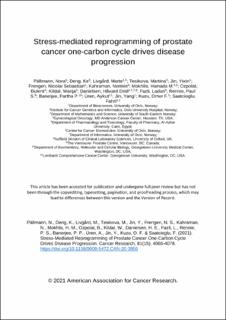Stress-mediated reprogramming of prostate cancer one-carbon cycle drives disease progression
Pällmann, Nora; Deng, Ke; Livgård, Marte; Tesikova, Martina; Jin, Yixin; Frengen, Nicolai Sebastian; Kahraman, Nermin; Mokhlis, Hamada M.; Ozpolat, Bulent; Kildal, Wanja; Danielsen, Håvard Emil Greger; Fazli, Ladan; Rennie, Paul S.; Banerjee, Partha P.; Uren, Aykut; Jin, Yang; Kuzu, Omer F.; Saatcioglu, Fahri
Peer reviewed, Journal article
Accepted version
Permanent lenke
https://hdl.handle.net/11250/3064234Utgivelsesdato
2021Metadata
Vis full innførselSamlinger
Originalversjon
Pällmann, N., Deng, K., Livgård, M., Tesikova, M., Jin, Y., Frengen, N. S., Kahraman, N., Mokhlis, H. M., Ozpolat, B., Kildal, W., Danielsen, H. E., Fazli, L., Rennie, P. S., Banerjee, P. P., Üren, A., Jin, Y., Kuzu, O. F. & Saatcioglu, F. (2021). Stress-Mediated Reprogramming of Prostate Cancer One-Carbon Cycle Drives Disease Progression. Cancer Research, 81(15), 4066-4078. https://doi.org/10.1158/0008-5472.CAN-20-3956Sammendrag
One-carbon (1C) metabolism has a key role in metabolic programming with both mitochondrial (m1C) and cytoplasmic (c1C) components. Here we show that activating transcription factor 4 (ATF4) exclusively activates gene expression involved in m1C, but not the c1C cycle in prostate cancer cells. This includes activation of methylenetetrahydrofolate dehydrogenase 2 (MTHFD2) expression, the central player in the m1C cycle. Consistent with the key role of m1C cycle in prostate cancer, MTHFD2 knockdown inhibited prostate cancer cell growth, prostatosphere formation, and growth of patient-derived xenograft organoids. In addition, therapeutic silencing of MTHFD2 by systemically administered nanoliposomal siRNA profoundly inhibited tumor growth in preclinical prostate cancer mouse models. Consistently, MTHFD2 expression is significantly increased in human prostate cancer, and a gene expression signature based on the m1C cycle has significant prognostic value. Furthermore, MTHFD2 expression is coordinately regulated by ATF4 and the oncoprotein c-MYC, which has been implicated in prostate cancer. These data suggest that the m1C cycle is essential for prostate cancer progression and may serve as a novel biomarker and therapeutic target.
Significance: These findings demonstrate that the mitochondrial, but not cytoplasmic, one-carbon cycle has a key role in prostate cancer cell growth and survival and may serve as a biomarker and/or therapeutic target.
